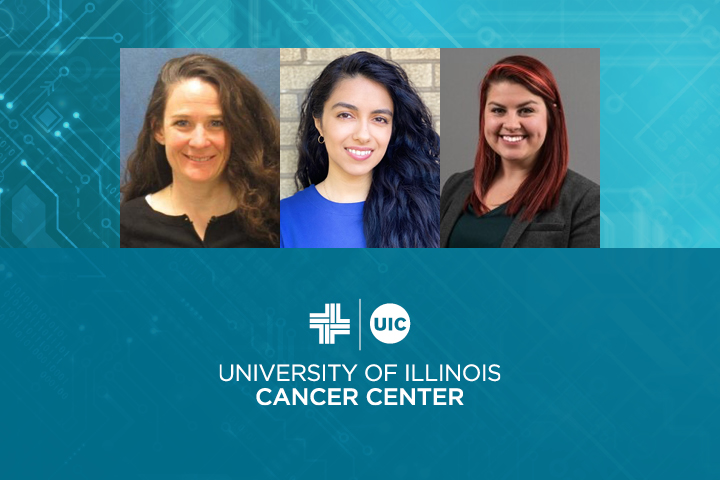
Three University of Illinois Chicago School of Public Health graduate students recently completed their applied practice experiences at the University of Illinois Cancer Center’s Community Engagement and Health Equity Office (CEHE).
Under the tutelage of Leslie Carnahan, PhD, research scientist in the CEHE office, Master of Science candidates Colleen Hallock and Brenda Soto assisted the Illinois Cancer Partnership in developing the 2022-2027 Illinois Comprehensive Cancer Control Plan, a blueprint to increase access to cancer awareness, education, screening, treatment and long-term survivorship care for all Illinoisans, regardless of geography, financial status, insurance coverage, or any other characteristic. The Plan is directed by the Illinois Department of Public Health.
For the first time, Illinois’ forthcoming Plan will include a community engagement strategy, implemented by the CEHE team, Carnahan said. Soto, a student in the Division of Health Policy Administration, is leading the initiative to prepare a draft of a resolution to be presented to the Illinois Legislature. The declaration, tentatively scheduled to be submitted at the beginning of the 2022 legislative session, is a call to action for policy makers to address cancers in their communities, she said.
Hallock, an oncology nurse, utilized her expertise in providing technical assistance to the Cancer Plan working groups while they were developing strategic goals and objectives. Both Hallock and Soto also prepared written materials for the Plan about cancer sites, which included information about prevention, screening, and detection, incidence, and disparities.
A third student, Alexandra Larkin, who recently received her Master of Public Health degree in the Community Health Sciences division at UIC’s School of Public Health, completed a qualitative evaluation of the Mile Square Accessible Mammogram and Outreach and Engagement (Mi-MAMO) program, which provides patient navigation, screening and diagnostic services to uninsured and underinsured individuals at no cost.
Guided by the Precaution Adoption Process Model, the evaluation explored the women’s experiences with using the Mi-MAMO program and motivating factors and barriers to timely and routine mammography utilization. Evaluation results will be used to improve current breast cancer screening and navigation programs and inform future initiatives. Larkin’s practicum activities have been guided by Vida Henderson, PhD, PharmD, MPH, MFA, director of the CEHE office.
